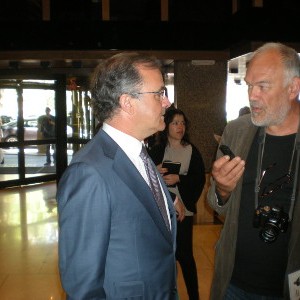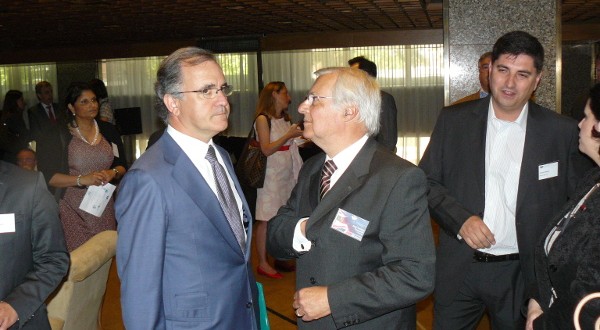It’s not every day that you meet the Minister, if you don’t live in the capital yourself, and even if you do, the Minister himself doesn’t spend every day in the capital. He often travels around the country, sometimes even abroad. Around midday he was expected at a lunch with the businesspeople of the Portuguese and Foreign Chambers of Industry and Commerce. You paid fifty euros for admission, plus VAT, and then were happy to wait for the Minister. Sometimes you wait your whole life for something, often you don’t know why, almost always without an obvious reason. Waiting is as much part of Portugal as the sun. One o’clock passed, and then an extra quarter of an hour, and then at some stage a black limousine drew up at the doorway of the big hotel.
A doorman opened the door, the Minister got out, shook a few hands, patted a few gentlemen on the shoulder, embraced a few party friends, and gave a forced smile. He already looked a bit tired, had come from one official opening and wanted to get to the next, after the meal. He was sweating a little, and his suit and tie were not a good fit. A man with a packed schedule, as he came through the door the journalist stopped him with a microphone. Minister, will you allow me to ask a quick question? The Minister, who was in a rush, did so. What is the specific value of the concept of sustainability in your policy?

The question was not really opportune for the Minister. What do you mean by sustainability? he asked, returning the question. Sustainability in environmental, in financial or in social policy? Actually, the whole of our last year’s policy is sustainable. Please give our readers an example, the journalist asked. Not now, now we want to go and have something to eat first of all, the Minister said. And so, after the starter, he began his talk about that last year, when he was appointed Minister. At the same time, the journalist was choking on a little bit of salt-cod with bitter cabbage. The hotel chef must have had a premonition about the importance of his creation. To every helping, he added a dash of the true expression of the country’s situation. That was the only explanation for the strange taste of the main course, which was submerged by the petty, dressed-up figures of Portuguese economic growth, about which the Minister was reporting. He closed his speech with the words Let us make Portugal into an investment-friendly country.
In the journalist’s family, Casual Friday always started on a Monday. In contrast, the dress code of those who wrongly thought of themselves as the country’s elite had more in common with a funeral scene from a film by the old director Manoel de Oliveira. So, the journalist explained why he was unable to appear at the lunch in a suit and tie. The Portuguese are a people with a capacity for suffering, commented a businessman sitting beside him, who was very familiar with Portugal’s oligarchic economy. He had now been watching this circus for fifty years. The journalist too had a little anniversary to celebrate. For a quarter of a century, he had had the honour of getting to know Portuguese politicians at first hand. Sometimes he talked to them, but he preferred to observe them from a near distance, like on a visit to Sete Rios. He tried to find out what exactly caused and drove them to become alphas in the political cage; what motivated them to reach the heart of power? And what did they do then? In the process, he also wondered what it was that qualified a beer brewer to become Minister of the Economy?
Sometimes you wait your whole life for something, often you don’t know why, almost always without an obvious reason.
The Minister’s professional, economic and political mind-set betrays his academic background. He did a doctorate at the Spanish Catholic Opus Dei University of Navarra. After that, he managed a well-known brewery for many years. His government’s policy was marked by spending cuts in the public service, by tax increases, selling off state-owned companies, making labour cheaper and relaxing protection against dismissal, and by horrendous tolls on motorways, unparalleled in Europe. Workers who still had a job had to accept the loss of four days of holiday and worked 30 minutes extra every day without an increase in salary. Businesspeople were strangled to the edge of viability by bureaucracy with new directives. In a country where 16 percent of people of working age were unemployed, this policy led firstly into a one-way street that many people increasingly saw as a cul-de-sac. Portugal’s well-educated young people left the country in their tens of thousands, because almost one in three was unemployed. The number of people going hungry rose, and the next summer with climate-induced forest fires was around the corner. He preferred not to ask any questions about corruption.
But the journalist raised his hand once more. He arranged his thoughts into a few questions. Minister, what do you think of the idea of linking the power of the economy to the contentment of its citizens? How do you propose to strengthen Portugal’s economy by making it less dependent on fossil fuels? What prospects do you see for the future, if for once we overlook spending cuts and tax increases? But the Minister’s diary was much too full for the answers to these questions. In addition, the Minister’s speaker had the journalist informed that the Minister’s words should not be published. At a time when money and time meant everything and nothing, and there was not enough of either, every government only took on the burdens of its predecessor with a backward-looking outlook. But in a world where there was still no room for creative, forward-looking visions with concepts and technologies for a sustainable, better equipped country, even the media were only interested in returning the country to the financial markets.
 Eco123 Revista da Economia e Ecologia
Eco123 Revista da Economia e Ecologia


